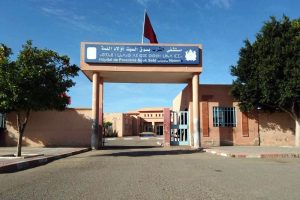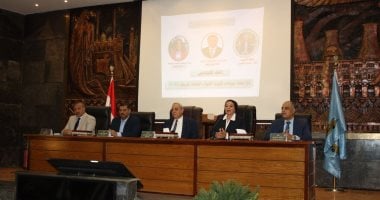Following directives from the political leadership to preserve the environment, Dr. Manal Awad, Minister of Local Development and Acting Minister of Environment, oversaw preparations to confront severe air pollution episodes during the 2025 rice harvest season across various governorates. An integrated work system was initiated among ministries and concerned bodies (Environment, Agriculture, Local Development) to overcome obstacles faced by executive leadership during the rice harvest and the open burning of agricultural residues, which affects air quality.
Dr. Manal Awad explained that these extensive meetings in the governorates aim to review preparations and proactive measures to face severe air pollution episodes this year, define roles and responsibilities of relevant entities, and coordinate local and international efforts to reduce pollution and combat climate change effects. Due to the ministry’s efforts, farmers’ awareness of the economic importance of straw and the harms of burning it has increased, turning straw into an economically valuable commodity, which reduced open burning rates and increased collected quantities. This system has created new job opportunities in rural areas for small farmers and NGOs, making it a success story in Egypt’s fight against climate change.
In this context, Major General Ashraf El-Gendy, Governor of Gharbia, met with a delegation from the Ministry of Environment, representatives from the Ministries of Agriculture and Local Development, and concerned bodies at the governorate headquarters, attended by Dr. Mahmoud Eissa, Deputy Governor of Gharbia, Major General Ahmed Anwar, Secretary-General of the Governorate, Dr. Omima Sawwan, Advisor to the Waste Management Authority, Dr. Walid Turk, Director-General of the Technical Office for Branch Affairs, Dr. Mohamed Qutb, Head of the Regional Branch of the Environmental Affairs Agency in Central Delta, Dr. Alaa Azzouz, Head of Agricultural Guidance Sector at the Ministry of Agriculture, Dr. Essam Amer, Advisor to the Ministry of Environment, Dr. Mohamed Hassan, National Coordinator of the Air Pollution and Climate Change Management Project in Greater Cairo, representatives of the Ministry of Endowments and the Church, and several governorate leaders and World Bank team members.
The governor emphasized the importance of finding appropriate ways to overcome challenges faced by farmers, rice straw contractors, and investors, defining roles and responsibilities among different entities, and coordinating to avoid obstacles during the harvest season. He stressed facilitating contractors’ access to necessary equipment for collecting and processing agricultural residues and managing work teams and traffic routes in the most harvested rice areas.
At the meeting’s conclusion, the governor confirmed that the governorate has raised the highest preparedness level for the 2025 rice harvest season through an integrated work system coordinated with all ministries and executive bodies to implement safe agricultural residue disposal plans and reduce emissions, ensuring a healthy and safe environment for citizens, continuing the success story achieved in previous seasons.
Dr. Mahmoud Eissa, Deputy Governor of Gharbia, stressed the need for concerted efforts, coordination, and integration among all concerned parties to combat open burning of agricultural residues by promoting recycling to produce fertilizers and fodder, reducing air pollutant emissions in preparation for the rice straw season, confronting and eliminating this phenomenon, and benefiting from straw instead of burning it. He confirmed that the governorate is taking all measures to implement an integrated system for safe agricultural residue disposal and reduce open burning, coordinating with heads of centers, cities, districts, the Agriculture Directorate, and the Environmental Affairs Department at the general office, alongside operating a central operations room linked to the Ministry of Environment to receive burning reports.
Dr. Essam Amer, Advisor to the Ministry of Environment, reviewed the ministry’s efforts last year to reduce the effects of severe air pollution episodes, limit agricultural residue burning, encourage its utilization, and coordinate with various entities such as the Ministry of Agriculture to provide sites meeting specific criteria for rice straw collection. He highlighted the importance of environmental awareness, especially through Islamic and Christian religious institutions raising community awareness across different groups. He noted that the early warning system of the Environmental Affairs Agency has proven highly accurate in predicting stagnant and light hours during the 2024/2025 season, enhancing confidence in forecasts for the 2025/2026 season. He also stressed increasing inspection teams on developed charcoal kilns, removing random municipal kilns, garbage dumps, and accumulations along roads to reduce open burning.
Additionally, he emphasized strengthening efforts to reduce pollution from vehicle exhausts in cooperation with the Ministry of Interior and monitoring industrial facilities with the Ministry of Industry.
Dr. Mohamed Qutb, Head of the Regional Branch of the Environmental Affairs Agency in Central Delta, reviewed the results of pollution control efforts during the 2024 season in Gharbia, including activating decisions to ban operation of informal small industries, intensifying exhaust campaigns, opening agricultural residue collection sites, and issuing violation reports. He noted that Law No. 202 of 2020 stipulates strict penalties for violating the open burning ban, including imprisonment for up to one year and fines ranging from 50,000 to one million Egyptian pounds or either penalty.
Dr. Mohamed Hassan, Director of the World Bank Project for Air Pollution and Climate Change Management in Greater Cairo, emphasized the project’s importance in reducing air pollutant emissions from the most impactful sectors in Greater Cairo, contributing to optimal climate change management. He explained that the project addresses the two largest main sources of air pollution: open burning of residues and vehicle emissions. He added that the project establishes and operates networks to monitor greenhouse gases and short-lived climate pollutants, integrating them with existing networks and implementing an integrated management plan for climate and air quality.
Dr. Alaa Azzouz, Head of Agricultural Guidance Sector at the Ministry of Agriculture, explained the ministry’s continued technical support to farmers, facilitating contractors’ access to equipment for collecting and processing agricultural residues, conducting awareness campaigns in cooperation with branches of the Environmental Affairs Agency in governorates to support safe agricultural residue management practices, and ongoing monitoring of all residue collection sites.
Attendees stressed the importance of supporting and developing environmentally friendly projects that provide golden opportunities to dispose of and benefit from rice straw. They also emphasized intensifying awareness campaigns to protect the environment, educating farmers on how to recycle rice straw into organic fertilizer and livestock fodder, and conducting seminars to inform them about the risks of burning and the benefits to the environment, humans, and animals from recycling and utilizing straw. These seminars are organized by the Agricultural Guidance Agency through agricultural directorates. They confirmed the necessity of benefiting from rice straw and facilitating procedures for contractors and farmers.












Recommended for you
Exhibition City Completes About 80% of Preparations for the Damascus International Fair Launch
Talib Al-Rifai Chronicles Kuwaiti Art Heritage in "Doukhi.. Tasaseem Al-Saba"
Unified Admission Applications Start Tuesday with 640 Students to be Accepted in Medicine
Egypt Post: We Have Over 10 Million Customers in Savings Accounts and Offer Daily, Monthly, and Annual Returns
His Highness Sheikh Isa bin Salman bin Hamad Al Khalifa Receives the United States Ambassador to the Kingdom of Bahrain
Al-Jaghbeer: The Industrial Sector Leads Economic Growth